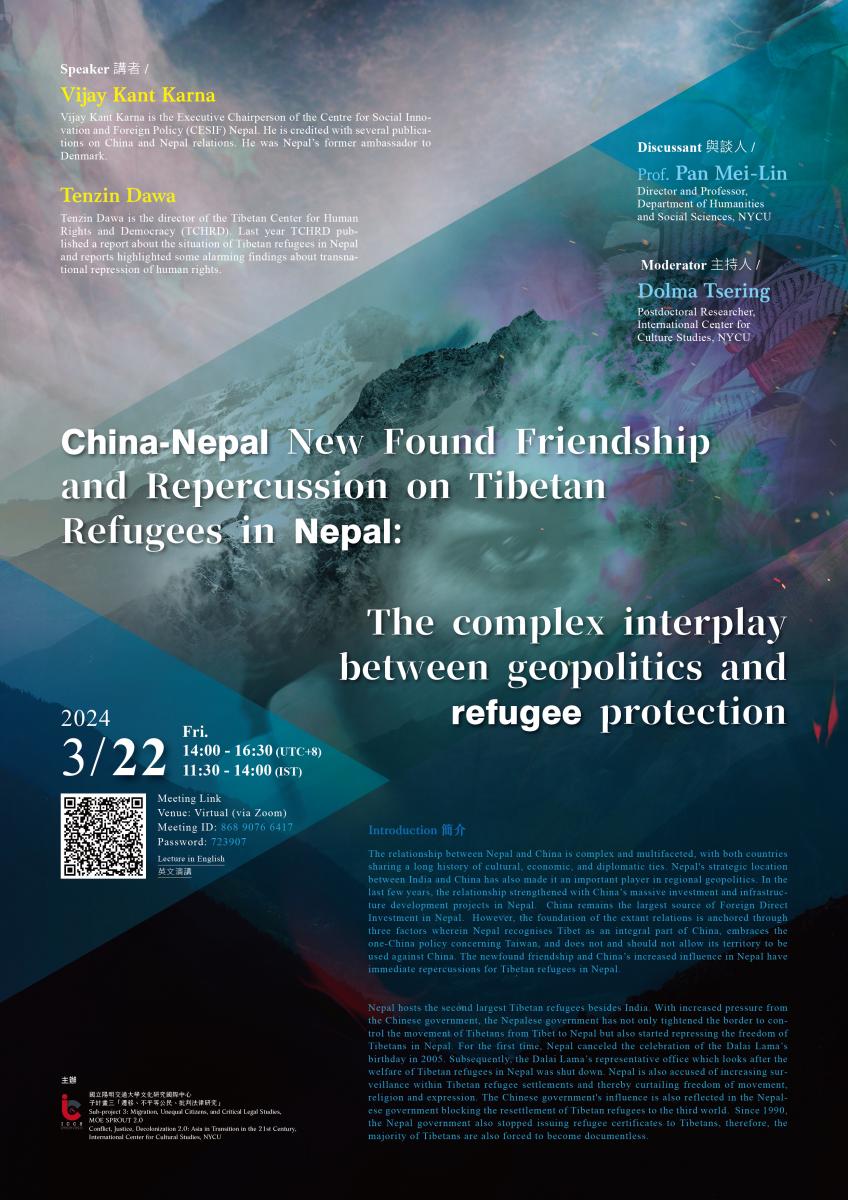


2024-03-15 - 2024-03-26
【線上演講 Online Discussion】
📌Date: March 22, 2024 (Fri.)
14:00 - 16:30 (Taipei, GMT+8)
11:30 - 14:00 (IST)
📌Venue: Virtual (via Zoom)
📌Zoom Meeting: https://us02web.zoom.us/j/86890766417......
Meeting ID: 868 9076 6417
Password: 723907
📌英文演講Lecture in English
-
📢Speakers 講者
Vijay Kant Karna
Vijay Kant Karna is the Executive Chairperson of the Centre for Social Innovation and Foreign Policy (CESIF) Nepal. He is credited with several publications on China and Nepal relations. He was Nepal’s former ambassador to Denmark.
Tenzin Dawa
Tenzin Dawa is the director of the Tibetan Center for Human Rights and Democracy (TCHRD). Last year TCHRD published a report about the situation of Tibetan refugees in Nepal and reports highlighted some alarming findings about transnational repression of human rights.
-
📢Discussant 與談人
Prof. Pan Mei-Lin
Director and Professor, Department of Humanities and Social Sciences, NYCU
-
📢Moderator 主持人
Dolma Tsering
Postdoctoral Researcher, International Center for Culture Studies, NYCU.
-
Introduction 簡介
The relationship between Nepal and China is complex and multifaceted, with both countries sharing a long history of cultural, economic, and diplomatic ties. Nepal's strategic location between India and China has also made it an important player in regional geopolitics. In the last few years, the relationship strengthened with China’s massive investment and infrastructure development projects in Nepal. China remains the largest source of Foreign Direct Investment in Nepal. However, the foundation of the extant relations is anchored through three factors wherein Nepal recognises Tibet as an integral part of China, embraces the one-China policy concerning Taiwan, and does not and should not allow its territory to be used against China. The newfound friendship and China’s increased influence in Nepal have immediate repercussions for Tibetan refugees in Nepal.
Nepal hosts the second largest Tibetan refugees besides India. With increased pressure from the Chinese government, the Nepalese government has not only tightened the border to control the movement of Tibetans from Tibet to Nepal but also started repressing the freedom of Tibetans in Nepal. For the first time, Nepal canceled the celebration of the Dalai Lama’s birthday in 2005. Subsequently, the Dalai Lama’s representative office which looks after the welfare of Tibetan refugees in Nepal was shut down. Nepal is also accused of increasing surveillance within Tibetan refugee settlements and thereby curtailing freedom of movement, religion and expression. The Chinese government's influence is also reflected in the Nepalese government blocking the resettlement of Tibetan refugees to the third world. Since 1990, the Nepal government also stopped issuing refugee certificates to Tibetans, therefore, the majority of Tibetans are also forced to become documentless.
-
Organizer 主辦單位:
Sub-project 3: Migration, Unequal Citizens, and Critical Legal Studies, MOE SPROUT 2.0
Conflict, Justice, Decolonization 2.0: Asia in Transition in the 21st Century, International Center for Cultural Studies, NYCU.
國立陽明交通大學文化研究國際中心 子計畫三「遷移、不平等公民、批判法律研究」
近期活動 Recent Activities